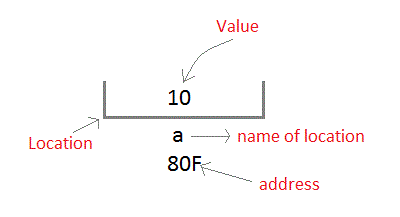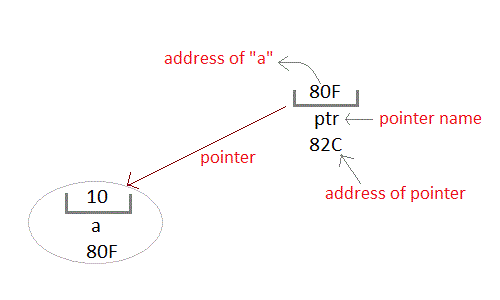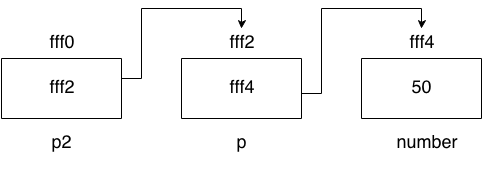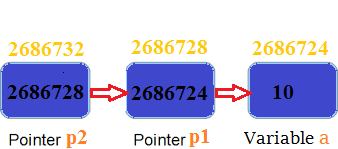What is pointer?
A pointer is a variable. that points to an address of a value.
When you define a variable in your program, the compiler allocates a memory location with a unique address to store that variable’s value. then you access the memory address through the pointer variable name.
For example, when you define a variable:
int x = 10;
You specified variable name ( x ), its data type int and its value, 10. The variable x resides in the memory with a unique memory address. To get the memory address of the variable x, you use the unary operator & as follows:
printf("The memory address of x is %p\n",&x);
Address in C :-
If var is the name of the variable, then &var will give it's address.
void main()
{
int var = 7;
printf("Value of the variable var is: %d\n", var);
printf("Memory address of the variable var is: %x\n", &var);
}
Output :-
Memory address of the variable var is: bcc7a00
Concept of Pointers :-
Let us assume that system has allocated memory location 80F for a variable a.
int a = 10;

The variables which are used to hold memory addresses are called Pointer variables.
A pointer variable is therefore nothing but a variable which holds an address of some other variable. And the value of a pointer variable gets stored in another memory location.

Benefits of using pointers :-
Declaring a pointer :-
Data type of a pointer must be same as the data type of the variable to which the pointer variable is pointing. void type pointer works with all data types, but is not often used.
int *ip // pointer to integer variable
float *fp; // pointer to float variable
double *dp; // pointer to double variable
char *cp; // pointer to char variable
Initialization of Pointer variable :-
#include<stdio.h>
void main()
{
int a = 10;
int *ptr; //pointer declaration
ptr = &a; //pointer initialization
}
#include<stdio.h>
void main()
{
float a;
int *ptr;
ptr = &a; // ERROR, type mismatch
}
Output :-
#include <stdio.h>
int main()
{
int *ptr = NULL;
return 0;
}
int main()
{
int a, *p; // declaring the variable and pointer
a = 10;
p = &a; // initializing the pointer
printf("%d", *p); //this will print the value of 'a'
printf("%d", *&a); //this will also print the value of 'a'
printf("%u", &a); //this will print the address of 'a'
printf("%u", p); //this will also print the address of 'a'
printf("%u", &p); //this will print the address of 'p'
return 0;
}
Points to remember while using pointers: :-
int main(){
int number=50;
int *p;
p=&number;//stores the address of number variable
printf("Address of p variable is %x \n",p);
printf("Value of p variable is %d \n",*p);
return 0;
}
output
Address of number variable is fff4
Address of p variable is fff4
Value of p variable is 50
NULL Pointer :-
int *p=NULL;
int main(){
int a=10,b=20,*p1=&a,*p2=&b;
printf("Before swap: *p1=%d *p2=%d",*p1,*p2);
*p1=*p1+*p2;
*p2=*p1-*p2;
*p1=*p1-*p2;
printf("\nAfter swap: *p1=%d *p2=%d",*p1,*p2);
return 0;
}
output :-
After swap: *p1=20 *p2=10
Pointer to a Pointer(Double Pointer) :-
Here, we have used two indirection operator(*) which stores and points to the address of a pointer variable i.e, int *. If we want to store the address of this (double pointer) variable p1, then the syntax would become:
int ***p2
pointer to pointer example :-

p2 contains the address of p (fff2) and p contains the address of number variable (fff4).
int main(){
int number=50;
int *p;//pointer to int
int **p2;//pointer to pointer
p=&number;//stores the address of number variable
p2=&p;
printf("Address of number variable is %x \n",&number);
printf("Address of p variable is %x \n",p);
printf("Value of *p variable is %d \n",*p);
printf("Address of p2 variable is %x \n",p2);
printf("Value of **p2 variable is %d \n",*p);
return 0;
}
output :-
Address of p variable is fff4
Value of *p variable is 50
Address of p2 variable is fff2
Value of **p variable is 50
int main() {
int a = 10;
int *p1; //this can store the address of variable a
int **p2;
/* this can store the address of pointer variable p1 only.
It cannot store the address of variable 'a'
*/ p1 = &a;
p2 = &p1;
printf("Address of a = %u\n", &a);
printf("Address of p1 = %u\n", &p1);
printf("Address of p2 = %u\n\n", &p2);
// below print statement will give the address of 'a'
printf("Value at the address stored by p2 = %u\n", *p2);
printf("Value at the address stored by p1 = %d\n\n", *p1);
printf("Value of **p2 = %d\n", **p2); //read this *(*p2)
/* This is not allowed, it will give a compile time error-
p2 = &a;
printf("%u", p2);
*/ return 0;
}
output :-
Address of p1 = 2686728
Address of p2 = 2686732
Value at the address stored by p2 = 2686724
Value at the address stored by p1 = 10
Value of **p2 = 10
Explanation of the above program :-

Previous Next
Trending Tutorials
0.0 / 5
0 Review
 What is C
What is C 